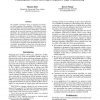Free Online Productivity Tools
i2Speak
i2Symbol
i2OCR
iTex2Img
iWeb2Print
iWeb2Shot
i2Type
iPdf2Split
iPdf2Merge
i2Bopomofo
i2Arabic
i2Style
i2Image
i2PDF
iLatex2Rtf
Sci2ools
106
click to vote
AAAI
2006
2006
Forgetting and Conflict Resolving in Disjunctive Logic Programming
We establish a declarative theory of forgetting for disjunctive logic programs. The suitability of this theory is justified by a number of desirable properties. In particular, one of our results shows that our notion of forgetting is completely captured by the classical forgetting. A transformation-based algorithm is also developed for computing the result of forgetting. We also provide an analysis of computational complexity. As an application of our approach, a fairly general framework for resolving conflicts in inconsistent knowledge bases represented by disjunctive logic programs is defined. The basic idea of our framework is to weaken the preferences of each agent by forgetting certain knowledge that causes inconsistency. In particular, we show how to use the notion of forgetting to provide an elegant solution for preference elicitation in disjunctive logic programming.
AAAI 2006 | Classical Forgetting | Disjunctive Logic Programming | Disjunctive Logic Programs | Intelligent Agents |
Related Content
| Added | 30 Oct 2010 |
| Updated | 30 Oct 2010 |
| Type | Conference |
| Year | 2006 |
| Where | AAAI |
| Authors | Thomas Eiter, Kewen Wang |
Comments (0)

